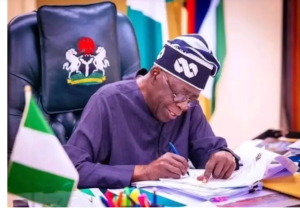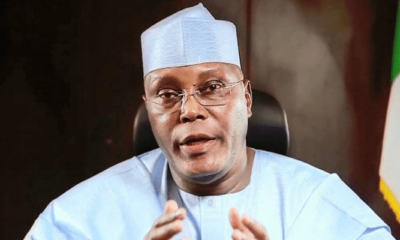Naija News
How Nigeria Lost $2 Billion Yearly To Under-Explored Cocoa Industry

Key figures in Nigeria’s finance and agriculture sectors have revealed a staggering annual loss of $2 billion in the country’s under-utilized cocoa industry.
This disclosure was made at the 2024 International Cocoa and Chocolate Forum, held concurrently at the Transcorp Hilton Hotel in Abuja and the Sheraton Hotel in Victoria Island, Lagos.
The forum, which saw the participation of the Minister of Finance and Coordinating Minister of the Economy, Wale Edun, and the Minister of Budget and Economic Planning, Senator Abubakar Atiku, highlighted the untapped potential of Nigeria’s cocoa sector.
The event was also attended by various stakeholders within the Nigerian Ministry of Agriculture.
A communiqué jointly signed by HRM Oba Dokun Thompson, Founder of the International Cocoa Diplomacy, Dr. Patrick Adebola, Executive Director of the Cocoa Research Institute of Nigeria, and Mr. Abba Bello, Managing Director of Nexim Bank, underscored the forum’s focus on the challenges and opportunities in the cocoa industry.
The conference provided a platform for policymakers, financial institutions, and stakeholders across the continent to discuss strategies for leveraging the African Continental Free Trade Area (AfCFTA) and other emerging cocoa and chocolate markets.
One of the critical topics addressed was the new European Union Deforestation Regulation, known as EUDR, and its implications for the cocoa industry.
The communique reads, “Chief Olawale Edun, who chaired the programme in Abuja, in his opening address, focused on the future of cocoa and value-add and the role it is expected to play in Nigeria’s emerging and transformational economy, while the remarks of the Honourable Minister of Budget and Economic Planning, His Excellency Senator Abubakar Atiku Bagudu who was the Special Guest of Honour focused on the importance of de-risking agric financing, with the provision of sustainable finance and infrastructure to ensure various sectors of the economy work.
“The keynote speaker and special guest of the Abuja programme was the Honourable Minister of Agriculture and Food Security, Senator Abubakar Kyari who was ably represented by Mr E. Iwara, Director, Crops Protection, delivered his keynote on the subject, Productivity versus Production in Agriculture in relation to Value Creation within the singular market, the African Continental Free Trade Area (AfCFTA).
“Although the country remains the fourth largest producer of cocoa with about 6.5% of the world’s production output and remains the fourth largest exporter with receipts of close to US$700million, the country’s industry has continued to decline even though cocoa can be produced in over 24 states in the country with tremendous potential for growth.
“There are several value chain development opportunities within the global cocoa industry that are not being explored in Nigeria due to a lack of the cocoa culture and full appreciation of the value propositions with the country losing over US$ 2 billion every year.
“The Nigerian Cocoa Industry does not have any form of policy, mapping, identification or data that can help respond to the EUDR or COP28 resolutions and to also plan for social and economic development purposes,” they observed.
“Europe remains the biggest market for West African cocoa and its derivatives but cocoa from the region will be subjected to the new EUDR policy which will come into effect on 1st January 2025 and will possibly disrupt the industry supply chain and the country’s forex earnings from cocoa and other products namely coffee, soya, timber, palm oil, rubber and cattle and their derivatives.
“The different aspect of the Nigerian cocoa supply chain and the smallholder cocoa farmers appear to be unaware of the new EUDR policy and its compliance requirements and remain unprepared as to who is responsible for what.
“There is a lack of proper and creative funding to fully develop the opportunities within the industry. Cocoa Research Institute of Nigeria, CRIN is underfunded and NEXIM Bank is not structured or funded like its counterparts, eg, AFREXIM or EXIM Bank of India, to undertake major investments and financing of necessary and required major infrastructure projects to further the export trade.
“Manufacturing has become unattractive due to the lack of necessary infrastructure to support the services rendered that will make the cost of production and quality competitive with imported products and we need agriculture that must lead into industrialisation.
“N100Billion was set aside for an Agric Development Fund out of the 2024 Agric Budget of N900Billion to support endeavours such as the ICD Forum which had world views because the country will be competing with other countries who may have several policies and subsidy regimes to take advantage of market share and it is important to recalibrate government policies now and again to compensate for gaps and to provide the infrastructure that will ensure various sectors of the economy work.
“There is a need to and it is imperative that cocoa is de-commoditized as the prerequisite to fully achieve value addition and make cocoa a vehicle for inclusive development, wealth and prosperity creation with sustained awareness about the economic value of cocoa and its value chain opportunities
“The country needs to transit from being a cocoa-producing to a consuming one. There must be deliberate consumption of cocoa products as a way to create the cocoa culture being promoted by ICD including cocoa derivatives or cocoa beverages in the existing schools feeding program as this will also encourage domestic and international investments into the sector.”
Naija News
President Tinubu Signs Student Loans Act: A Step Forward in Higher Education Access

In a significant move aimed at reshaping the landscape of higher education financing in the country, President Bola Tinubu signed the Student Loans (Access to Higher Education) Act (Repeal and Re-Enactment) Bill, 2024, into law on Wednesday. This decisive action marks a pivotal moment in the ongoing efforts to enhance access to tertiary education for Nigerian students.
The genesis of this legislative milestone lies in the extensive reviews conducted by both the Senate and the House of Representatives on the report of the Committee on Tertiary Institutions and TETFund. These thorough examinations sought to address the challenges plaguing the accessibility of higher education and to formulate effective solutions that align with the evolving needs of the educational landscape.
The Student Loans Act represents a comprehensive overhaul of the existing framework governing student loans, aiming to streamline the process and make higher education more financially attainable for aspiring scholars across the nation. By repealing and re-enacting the bill, the government demonstrates its commitment to fostering an environment where education is not merely a privilege but a fundamental right accessible to all.
While specific details of the newly enacted law are yet to be disclosed, it is anticipated that it will introduce significant reforms designed to alleviate the financial burden on students pursuing tertiary education. These reforms may include provisions for lower interest rates, extended repayment periods, and enhanced mechanisms for loan disbursement and management. Such measures are crucial in ensuring that no deserving student is deprived of educational opportunities due to financial constraints.
Moreover, the enactment of this legislation underscores the government’s recognition of the pivotal role education plays in driving national development and economic growth. By investing in human capital through initiatives like the Student Loans Act, Nigeria stands to benefit from a more skilled workforce equipped to navigate the complexities of the modern world and contribute meaningfully to society.
As the details of the Student Loans Act unfold in the coming days, stakeholders in the education sector, including students, educators, policymakers, and the wider public, eagerly anticipate the positive impact it will have on higher education accessibility and affordability. The implementation of this law represents not only a legislative triumph but also a beacon of hope for countless young Nigerians aspiring to fulfill their academic aspirations.
In conclusion, President Bola Tinubu’s signing of the Student Loans Act marks a significant milestone in the ongoing quest to democratize access to higher education in Nigeria. By enacting progressive reforms informed by thorough deliberations and expert insights, the government reaffirms its unwavering commitment to empowering the youth and building a brighter future for the nation.
Details of the enacted law are expected to be unveiled shortly, heralding a new era of opportunity and inclusivity in Nigerian higher education.
Naija News
Nigeria’s Current Affairs: A Comprehensive Overview

Nigeria, the giant of Africa, remains a nation pulsating with dynamic socio-political and economic developments. In recent times, a plethora of events has unfolded, offering a nuanced glimpse into the country’s multifaceted landscape. From government initiatives to combat illegal mining to discussions on minimum wage and security challenges, Nigeria’s current affairs paint a picture of a nation navigating through a myriad of challenges and opportunities.
Marshaling Against Illegal Mining:
The launch of the Marshals by Minister Dele Alake underscores Nigeria’s commitment to tackling the menace of illegal mining and solid mineral smuggling. With the formation of this squad from the Nigerian Security and Civil Defense Corps (NSCDC), the government aims to safeguard the country’s mineral resources and curb illicit activities in the mining sector.
Governors’ Deliberations on Minimum Wage:
The Nigeria Governors Forum’s deliberations on the new minimum wage highlight the complexities involved in setting wage standards in a diverse nation like Nigeria. Emphasizing data-driven and evidence-based decisions, the governors underscore the importance of considering individual state peculiarities and economic realities before arriving at a consensus on the minimum wage issue.
Military Response to Security Challenges:
The recent tragic incidents in Delta State have once again brought to the forefront the challenges faced by Nigeria’s security forces. The military’s commitment to maintaining a strong presence in volatile regions demonstrates a resolute stance against perpetrators of violence, emphasizing the need for justice and restoring peace in affected areas.
Foreign Exchange Backlog Clearance and Airline Concerns:
While the Central Bank’s announcement of clearing foreign exchange backlogs is a positive development, concerns raised by foreign airline operators underscore the importance of transparency in financial transactions. The demand for evidence of payment reflects the need for accountability and clarity in economic policies affecting foreign entities operating in Nigeria.
Military Successes Against Terrorism:
The Minister of Information’s disclosure of military successes against terrorism offers a glimmer of hope in Nigeria’s ongoing battle against insurgency. However, it also serves as a reminder of the persistent threats faced by the country and the continued efforts required to ensure the safety and security of its citizens.
Political Developments and Leadership Dynamics:
Eyitayo Jegede’s withdrawal from the Ondo governorship race and the meeting between Governor Ododo and President Tinubu highlight the intricacies of Nigerian politics and the evolving dynamics within political parties. Additionally, the accusations leveled by Nnamdi Kanu’s family against Igbo leaders underscore the complexities surrounding identity politics and leadership accountability.
Economic Measures Amidst Challenges:
President Tinubu’s directive to ban foreign trips by government officials reflects a proactive approach to cost-cutting measures amid economic challenges. This move signals a commitment to fiscal responsibility and prudent financial management in navigating Nigeria’s economic landscape.
Conclusion:
Nigeria’s current affairs encapsulate a tapestry of events, from governmental initiatives to combat illegal activities to discussions on minimum wage and security challenges. As the nation grapples with various issues, including economic fluctuations and security threats, these developments underscore the importance of concerted efforts towards sustainable growth, transparency, and accountability in governance. Only through collective action and strategic policymaking can Nigeria overcome its challenges and realize its full potential as a beacon of progress in Africa.
Naija News
Senate President’s Claims on Delta State Military Murders Draw Criticism

The recent assertion by Senate President Godswill Akpabio regarding the gruesome murder of 16 military personnel in Delta State has sparked controversy and drawn sharp criticism from civil society organizations (CSOs) and security experts.
Akpabio’s remarks, made during a Senate plenary session, suggested a connection between the massacre and foreign mercenaries, implying that the perpetrators may not be from the Niger Delta region. This statement came as the Senate deliberated on setting up a committee to investigate the circumstances surrounding the killings.
Reacting to Akpabio’s claims, Auwal Musa Rafsanjani, Executive Director of Civil Society Legislative Advocacy Centre (CISLAC) and Transparency International-Nigeria (TI-Nigeria), condemned any attempt to provide a soft landing for the perpetrators of such heinous crimes. Rafsanjani emphasized that criminal acts should be unequivocally condemned, regardless of the perpetrators’ origins, asserting that a criminal remains a criminal irrespective of their nationality.
Similarly, Gad Peter, Executive Director of the CLEEN Foundation, cautioned political leaders against making hasty or speculative comments following incidents or crimes. Peter highlighted the importance of providing evidence to support such claims, especially when attributing responsibility to foreign entities. He called on Akpabio to substantiate his statement by providing concrete details regarding the alleged foreign involvement in the attack, suggesting that failure to do so could have significant diplomatic implications.
The remarks by CSOs and security experts underscore the need for responsible and evidence-based communication from public officials, particularly in matters involving national security and criminal investigations. Speculative statements not only risk inflaming tensions but also undermine public trust and confidence in the government’s ability to address security challenges effectively.
The call for thorough investigations into the Delta State military murders remains paramount, with stakeholders urging transparency and accountability in the quest for justice. As the nation grapples with security threats and acts of violence, it is imperative that political leaders exercise caution in their public statements, prioritizing factual accuracy and adherence to due process.
Ultimately, the resolution of such tragic incidents demands a concerted effort from all stakeholders, guided by a commitment to uphold the rule of law and protect the safety and security of all citizens, including members of the armed forces who bravely serve the nation.
-
Entertainment6 months ago
If you don’t laugh, I promise to return your data😂😂😂
-

 Naija News6 months ago
Naija News6 months agoNaira Surges To ₦780/$1 in Official Market Amid CBN’s Forex Moves
-

 Entertainment6 months ago
Entertainment6 months agoScammers Swipe ₦5 Billion From 3 Fintechs In Just 8 Months
-

 Naija News5 months ago
Naija News5 months agoAtiku Abubakar 2024 New Year Message To Nigerians
-

 Naija News6 months ago
Naija News6 months ago“You killed him because of N100′” – Man sentenced to death by hanging in Zamfara for killing his friend over N100
-

 Celebrity Gist6 months ago
Celebrity Gist6 months ago“He has my kind of voice” – Brain Jotter speaks on colleague, OGB ‘copying’ him
-

 Celebrity Gist5 months ago
Celebrity Gist5 months ago“All paid for” – Wizkid flaunts ₦1.4 billion Ferrari SF90
-

 Naija News6 months ago
Naija News6 months agoNIGERIA NEWSCBN Directs Banks To Continue Issuance, Acceptance Of Old Naira Notes After Supreme Court Verdict

